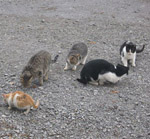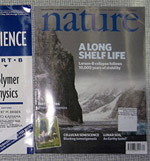Popular herbicide can be a secret killer of fish
 Fish,
Fish,  Freshwater
Freshwater The chemical glyphosate has emerged as the most widely used herbicide in the world. Often applied in the commercial formulation Roundup®, the chemical, at moderate concentrations, is generally considered low risk for many species of wildlife.
As a new study suggests, however, the popular herbicide may have unexpected negative impacts on fish by making them more vulnerable to disease. The study finds evidence that a glyphosate formulation and a particular parasite act sysnergistically to negatively impact a threatened New Zealand fish, the roundhead galaxias.
David Kelly and fellow researchers from New Zealand exposed the fish in a laboratory setting to moderate levels of glyphosate (i.e. within the manufacturers maximum recommended usage for North America) as well as a snail that serves as an intermediate host for the parasite.
They found that survival of the fish was unaffected by exposure to the parasite or moderate concentrations of glyphosate alone. However exposure to both glyphosate and the parasite at the same time reduced survival significantly. It is not entirely clear from the study whether the glysophate is making the fish more vulnerable to infection from the parasite or vice versa.
Either way, these findings have important implications for the regulation of glyphosate as an herbicide. While the chemical binds to the soil, it may reach freshwater bodies through surface runoff or drifting spray. Regulations on herbicides are supposed to limit negative impacts to aquatic organisms. However the researchers note,
"We used glyphosate in a formulation at concentrations that were similar to levels recorded in freshwaters, or within acceptable limits designated by regulatory authorities."
This mismatch between regulations and observed negative impacts may be due to the fact that glyphosate alone only begins to affect survival in fish at much higher concentrations. The study findings raise questions about conventional measures for evaluating the toxicity of herbicides to aquatic organisms and whether they're doing a good enough job taking into consideration complex synergistic effects. In terms of threatened fish, the researchers note,
"The timing of the application of glyphosate formulations is often in spring, coinciding with the period of larval fish emergence and early susceptibility to parasite infection; and early fish life stages are highly susceptible to environmental stressors, and factors that affect their survival are key determinants of population recruitment"
--Reviewed by Rob Goldstein
Kelly, D., Poulin, R., Tompkins, D., & Townsend, C. (2010). Synergistic effects of glyphosate formulation and parasite infection on fish malformations and survival Journal of Applied Ecology DOI: 10.1111/j.1365-2664.2010.01791.x




Reader Comments